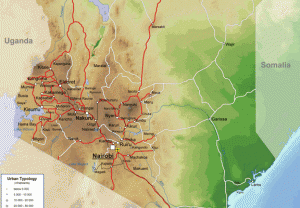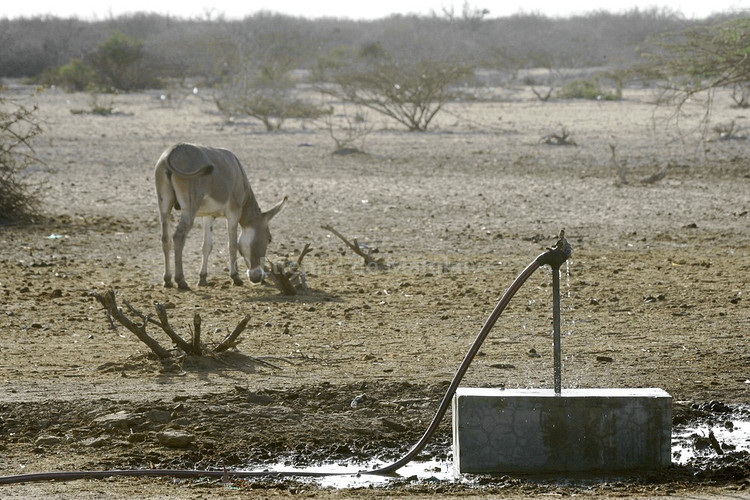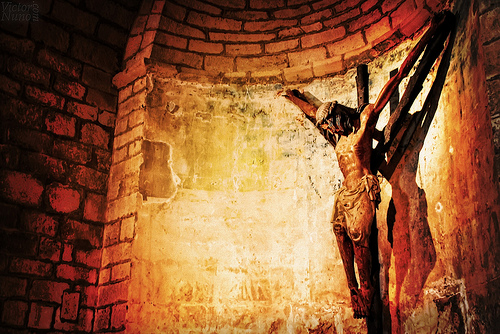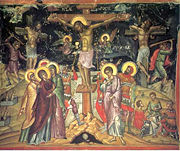The sermon preached at Trinity Episcopal Church, Mission, on The Sunday of the Passion: Palm Sunday, 14 April 2019, on the Rosebud Reservation in South Dakota.
Thirsting for life …
The Last Seven Words: “I thirst.” (John 19:28)
For the last week, I have been staying at the house of a friend while she and her family are on vacation. My job is to care for the house without breaking too many things, and to care for the family’s two dogs without letting them get away.
It is a lovely house in an older section of Arlington: Large, airy, filled with light, obviously much loved, and very much a home.
In the kitchen, there is one thing, however, that has completely captured my attention: a perpetual waterfall.
It is one of those things that is mounted on the wall, with a copper base that hides a small motor and water that flows continually down a slab of dark-green granite.
The waterfall flows day and night, making a gurgling, dripping noise that you can hear throughout my friend’s home.
I have not told my friend, and probably never will, but I can tell you:
This thing is driving me nuts!
I cannot stand the thing.
I know that it is a perpetual use machine, that the water is recycled constantly. I know that water is not being wasted.
Really. I do understand the mechanics of the thing.
And I know that this is supposed to be a soothing sound, the flow of water down the slab, the drip of the water when it hits the pool at the bottom …
I know all this …
And yet, the thing still drives me nuts.
Because more than most people, I understand the importance of water in our lives. I understand that without water, we cannot live.
A quarter-century ago, I was Peace Corps volunteer in Kenya. I was a water technician – meaning that I did water engineering projects sans the benefit of an engineering degree.
It was in Kenya, in the semi-arid portion of that nation in which I lived, that I learned more about water than I had in the previous 25 years of my life.
Like most of us here, I grew up with water – with clean water – readily available. Open a tap, and presto! There was life-giving water. Whenever I felt like it, whenever I was even mildly thirsty, I had water to drink.
In Kenya, I learned, first-hand, what it meant to live without water.
I learned what it was like to stand on the edge of the largest fresh-water lake in all of Africa, Lake Victoria, and not be able to take a drink.
I led a project that was bringing that water, with the assistance of two motors, up the steepest hill overlooking Lake Victoria, to a series of water tanks that my group built, and then flowing that water for miles – literally for miles, because the water tanks were on the highest ground around – so that people could have water.
And not only would they have water, but they would have clean water, because those three tanks I helped build would filter the water before it flowed out again, down the hill and across the plains to taps, where people would, many for the first time in their lives, be able to simply turn a faucet and … drink … water … clean … life-giving … water.
One day, when we were still in the construction stage, mixing cement and placing rocks and building the walls of these tanks, my crew and I ran out of water to drink. It was a blistering hot day, which was the norm on the equator in Kenya, and I had taken three bottles of water with me, water that I had boiled the night before … but now, it was all gone.
And there I stood, on the beach of the largest fresh-water lake in all of Africa, knowing that if I drank that water, I would take ill and possibly die, and that if I did not drink that water, I would take ill, and possibly die.
One of the young men who worked for me, who was learning to become afundi wa maji – a water engineer, one of the most exalted positions in Kenya – looked at me and said, “We have to drink that water. We have to. You have to. Or you will get sick. And you might die.”
In sub-Saharan Africa, the people face this dilemma every day of their lives. They build up some immunities to the various parasites that abound in their waters, but still, they take ill all the time. And some of them, especially their children, die.
My worker, my friend, Baraka (whose name means “blessing” in DhuLuo, his native language), was indeed a blessing to me that day.
So we both bent down, we filled our water bottles, we drank deeply of Lake Victoria, we poured the waters of that great lake over our heads … and we went back to work.
Both of us indeed took ill – which is the chance you take in Africa.
Neither of us died, which only came about by the grace of God.
So I know something about water … and I know a lot more about being thirsty, about crying out, “I thirst,” about being so dehydrated that my body feels on fire, my brain begins to cease its proper functions, my skin crawls with tightness …
All of which is why that perpetual waterfall in my friend’s kitchen is driving me nuts.
Because, even though I know it is not a waste of water, it sounds like a waste.
And I, who have been thirsty nearly unto death, cannot abide by wasting water.
Whenever I go to a friend’s house – which I do a lot, because I am a missionary with no fixed address and no fixed income – I have to restrain myself from turning off the water. I use little when I’m washing dishes (which drives my friends crazy). I take the shortest showers possible. I refuse to let a tap run while I am brushing my teeth. Sometimes, in other people’s houses, I cannot help myself – I walk boldly up to the kitchen sink and turn off the water that they have left running while cooking, or cleaning, or even filling cups. My friends, God bless them, understand this about me. They always make sure I have water to drink, and they try, once they get to know me, not to waste water in my presence.
I learned even more about water, and about great thirst, when I served as a missionary in Sudan, living on the both the edge of the Sahara and the banks of the mighty White Nile River, the longest river in the world.
In Sudan, water is an even more precious commodity than in Kenya, for much of Sudan, especially the northern half, is the Sahara. In Sudan, water is the symbol of hospitality – to friend and enemy alike, you always, always offer water first.
The cruelest month in that arid land is April, when the Fall rains have longed ended and the Summer rains are but a dream in the far distant future. In April, the temperature routinely soars to 140 degrees, while the humidity dives down to 4 percent.
In April, nature itself is so desperate, so thirsty, that it sucks all that water out of you that it can, drying you out, turning you into a husk … and once that water is gone from you, nature sucks other moisture from you as well, so that you can be walking along – trudging is more like it – with the sun beating down on you so hard it feels like a 50-pound weight is sitting on your head, and suddenly, you have a runny nose, which startles you, because your sinuses long ago dried out, leaving you with a constant, pounding headache, and it is only when you go to wipe your nose that you realize you have a nosebleed, that nature is now sucking out your very life.
In April, no matter how much water you drink – no matter how much water you filter so that you can drink it – it is never enough. Daily, I would filter up to three gallons of the precious commodity simply so I could drink. Three gallons. And still, it was not enough. So I would drink the water that others would offer me, knowing, as I had in Kenya two decades before, that if I drank it, I would take ill and possibly die, and if I did not drink it, I would take ill, and possibly die.
 So I drank the water that was offered to me in hospitality, by friend and enemy alike, and I did take ill, and I would return to the States with various parasites, so much so that I told my physician, who was constantly confounded by my diseases, “Don’t worry. I’m giving you more free continuing medical education than you ever dreamed of.”
So I drank the water that was offered to me in hospitality, by friend and enemy alike, and I did take ill, and I would return to the States with various parasites, so much so that I told my physician, who was constantly confounded by my diseases, “Don’t worry. I’m giving you more free continuing medical education than you ever dreamed of.”
And by the grace of God, I have lived through my ravaging thirsts.
As Jesus was hanging on the cross, wracked by pain and his own ravaging thirst, he, too, asked for a drink.
Some will say[1] that he did so because one of the intended by-products of crucifixion, a by-product of which the Romans knew well, was dehydration and powerful, body-wracking, brain-numbing thirst, and that Jesus’ cry was the fulfillment of Psalm 22, verses 14 and 15: “I am poured out like water, and all my bones are out of joint; my heart is like wax; it is melted within my breast; my strength is dried up like a potsherd, and my tongue sticks to my jaws; you lay me in the dust of death,” which is a terribly accurate description of a crucifixion, which, many say, was presaged in this particular psalm.
And some will say[2] that Jesus cried out, I thirst, because it was the fulfillment of Psalm 69, verse 21, “For my thirst, they gave me vinegar to drink,” even though the “vinegar” or “sour wine” they gave him was nothing more than the common wine that all people drank during the day – because they knew that their water, polluted as it was, would kill them, and that cheap wine would not.
And some, too, will say[3] that by having Jesus proclaim, with nearly his dying breath, that he was thirsty, the evangelist John was proving, once again, that Jesus was fully human as well as fully divine.
All of these interpretations may very well be true, alone or even together.
But I will say that Jesus, who knew more about life and giving life, actually was crying out for life itself. That his thirst was not just for water – he was dying, and he knew it, and no mere sip of water or wine was going to change that fact – that his thirst was for life itself.
And not just any life … not the life in which man oppresses man, and humanity turns its back on God and God’s desires … but the life that is nourishing and fulfilling and like that silly waterfall in my friend’s kitchen that drives me nuts, is perpetual.
Jesus’ thirst was more than just a human one brought on by torture and temperature and pain and agony.
His thirst, from the moment he first appeared on the banks of the River Jordan, was for a better life, for a life that was and is and ever will be centered in God, and in God’s great love for us.
At the end of his life, Jesus cared only for our lives.
He knew of the great thirsts that ravage our lives – pain, hunger, physical thirst, illness, oppression, war, hatred, division, poverty – and he desired to end all that.
His whole mortal life was lived as an example of how we could overcome those thirsts, lay aside our differences, unite in God’s love for us and our love for each other.
His thirst was for life.
For our lives.
Not as we know them.
But as they can be. As God declares they can be.
Jesus thirsted … even in those last, agonizing moments of his mortal life … for us.
• • •
Whenever I hear Jesus’ cry from the cross, I flash back to those days in my life when I, too, cried out, with great meaning and desire, “I thirst.” In the same moment, I am carried back into my own past, and to my old homes in Kenya and Sudan and to the people there, who still thirst every day, not just for water that will not kill them, but for the life that Jesus imagined for them, and as well into the future, to the place that can be, to the life that can be.
Jesus’ cry, for me, is not just about fulfilling the Scriptures, nor is it just about proving a theological point.
Jesus’ cry, for me, is about life.
God’s life – in us and through us and for us and with us.
Amen.
A sermon preached on Good Friday, 6 April 2012, Year B, at St. Francis Episcopal Church, Great Falls, Va., in conjunction with the Great Falls Ecumenical Council.
[1] The United Presbyterian Church of Middletown NY in ministry with Interim Pastor Jack Lohr, http://unitedinterim.blogspot.com/2009/04/good-friday-reflection-i-thirst-john.html, Friday, April 10, 2009.
[2] Ibid.
[3] Barclay’s Commentary, via http://www.abible.com/devotions/2007/20070329-1109.html.
A man on a mission: ‘It is finished’
Good Friday 2011
If you had been standing at the foot of the cross and saw the man you called “Lord,” the man you believed was the Son of God, crucified and dying, what would you think those words meant?
If all of your hopes and dreams were pinned on this one man, the one you had followed throughout Palestine, the one you listened to so closely, the one you watched cure the sick and raise the dead … what would you think those words – “It is finished” – meant?
Would all your dreams be dying up on that cross with him? Would all your hopes die up there as well?
Mary stood at the foot of the cross – Mary, Jesus’ mother. Surely she thought this was the end of all her hopes and dreams, watching her child die.
Mary the wife of Clopas and Mary Magdalene stood there. Surely they heard those words and thought, “It’s over.”
The beloved disciple stood there. He must have thought, with great heartbreak, “We were wrong.”
What would you have thought, if you had been at the foot of the cross that day 2,000 years ago, outside the gates of Jerusalem, when you heard Jesus say, “It is finished”?
(sing)
Were you there when they crucified my Lord?
Were you there when they crucified my Lord?
Oh, sometimes it causes me to tremble, tremble, tremble.
Were you there when they crucified my Lord?
My brothers and sisters in Christ, on this Good Friday, 2,000 years after that day when Jesus died, we are standing at the foot of the cross.
I want you to pay no attention to the fact that we already know (or, we think we know) the rest of the story. Forget about Easter morning for a moment, and concentrate on what it is like to stand at the foot of the cross.
Stand there … with Mary, the mother of Jesus, and Mary, the wife of Clopas, and Mary Magdalene, and the Beloved Disciple …
Stand right next to them …
And think about what Jesus meant when he said, “It is finished.”
(sing)
Were you there when they nailed him to the tree?
Were you there when they nailed him to the tree?
Oh, sometimes it causes me to tremble, tremble, tremble.
Were you there when they nailed him to the tree?
As you stand there, with all your hopes and dreams dying, remember:
This is John’s Gospel.
This is the way John tells the story.
Which means …
Which means …
There’s a different take that we have to examine on this particular Good Friday.
In Matthew’s and Mark’s Gospels, we hear the wounded and suffering Jesus call out, “Eloi! Eloi! Lema sabachthani?” “My God! My God! Why have you forsaken me?”
In Luke’s Gospel, Jesus promises paradise to the thief crucified with him, and then cries out in a loud voice, “Father, into your hands I commend my spirit!”
But in John’s Gospel, Jesus simply says, “It is finished.”
This is no sigh of defeat. This is not a cry of despair.
This is Jesus as John saw him, Jesus a man on a mission from God, a man who knew, from the beginning, exactly who he was, and what he was doing, and why he was doing it.
In John’s Gospel, we see a triumphant Jesus hanging on the cross, doing exactly what he was called to do, clear-minded, with a single, driving vision of which he never lost sight, from which he never wavered.[1]
Nowhere in this Gospel do we hear any pleas for release, any prayers to “remove this cup.” Nowhere does Jesus doubt that this moment on the cross is exactly what God planned, exactly what he was supposed to be doing.
John’s telling of the arrest, torture and crucifixion of Jesus is confident … vibrant … even a bit sassy.
Remember, at the Last Supper, he said, “One of you will betray me.”
At the Garden where they came to arrest him, he identified himself as “I AM,” taking for himself the name of God.
Standing before the high priest and Pilate, he practically taunted them: “You say that I am.”
He gets no help carrying the cross to Golgotha.
On the cross itself, he takes care of last things: To his mother, he says, “Woman, this is your son.” To his disciple, he directs: “This is your
mother.”
After that, knowing that it was finished, he said, “I thirst” – in order to fulfill the Scripture.
He sucked the wine out of the sponge, then proclaimed, “It is finished.”
And then he bowed his head and breathed his last.
Do you hear anything of defeat here?
Any doubt?
Any hesitation?
No!
Because this is John’s Gospel, and in John’s Gospel, Jesus knows exactly what he is doing, every step of the way, every moment of the day.
“It is finished” is not a plea of defeat.
It’s Jesus cry of triumph!
(sing)
Were you there when they pierced him in the side?
Were you there when they pierced him in the side?
Oh, sometimes it causes me to tremble, tremble, tremble.
Were you there when they pierced him in the side?
Now … understanding that in John’s Gospel, Jesus is a determined man on a mission from God … standing there at the foot of the cross with the women and the Beloved Disciple … now tell me, what exactly do you think Jesus meant when he said, “It is finished”?
Yes, Jesus died a terrible, painful, brutal, humiliating death. Do not lose sight of that.
But Jesus didn’t look at it that way – not in John’s Gospel.
For Jesus, “It is finished” is a statement of glory.[2]
As commentator David Lose writes,
“The great irony of John’s passion is that in Jesus we see God’s strength, majesty and might revealed amid the pain and humiliation of crucifixion. … John’s depiction of the Passion of our Lord reminds us that, ultimately, Jesus is Lord. Through him, God overcomes any and all obstacles – including death – in order to redeem and restore us.”[3]
Which means that when we hear Jesus say, “It is finished,” what he’s telling us, from that pain-filled place on the cross, is that his job is over.
He has shown us how to live – in love.
And he has given us a vision – the vision – on which we are called to focus, every moment of our lives.
Everything Jesus did, everything he said, everything he taught, every miracle he performed and prayer he prayed was done in the sure and certain knowledge that this is what God wanted done.
Just as Jesus never wavered, so we are not to waver.
(sing)
Were you there when they laid him in the tomb?
Were you there when they laid him in the tomb?
Oh, sometimes it causes me to tremble, tremble, tremble.
Were you there when they laid him in the tomb?
Yes, we are called to witness the crucifixion this day, to wonder and cry.
And we should be filled with trembling. We should be trembling all over!
Because Jesus just turned the whole job over to us! He’s given us the whole shebang!
Everything he did? All that preaching and teaching and healing and bringing back to life?
He’s done with that.
Now it’s our turn.
Yes, we should be trembling right about now, because now …
… Now we are the ones who have to do what he did, we are the ones who have to take up our own crosses, we are the ones who have to die to all the things that get in the way of our lives in God!
Now we have to preach the Gospel, the Good News of God in Christ Jesus!
Now we have to teach the world how to live in unity and peace, instead of discord and war!
Now we have to heal the sick and bring life – new life – to all those who live in death! We are the ones who are to give hope to the hopeless, who are to love the unloved, who are to fulfill the dream of God.
So yes, we should be trembling right now, because Jesus just put all his work on our shoulders and in our hearts. And that frightening thought should make us tremble!
Robert Fulgham once famously said, “All I really needed to know I learned in kindergarten,” and in many ways, that is true.
But the reality is, everything we really need to know? We learned it all from Jesus.
That’s why Jesus was so triumphant on the cross.
That’s why Jesus said, “It is finished.”
Because his part – his earthly part of teaching us, of training us, of inspiring us? That’s done.
Jesus had a job to do and he did it.
Now, he’s given the job to us – and trusting us to do it.
So, yeah, we should be trembling – heck, we should be quaking in our boots right about now!
Because we have no more excuses.
Jesus was a man on a mission from God, and he wants us to go on that mission as well.
“It is finished”?
It means that from now on, we have to do the work that Jesus did, because Jesus has called us, because Jesus trusts us, because Jesus is counting on … us.
We are on a mission from God, my friends.
It’s not Jesus’ job any more. His part? It is finished. Over with. Done. Fini.
Now? Now it’s all up to us.
Amen.
Sermon for Good Friday, 22 April 2011, Year A, Trinity Episcopal Church, Arlington, Va.
[1] Professor David Lose, Marbury E. Anderson Biblical Preaching Chair, Luther Seminary, St. Paul, Minn., “Commentary on the Gospel,” Good Friday, 22 April 2011,








